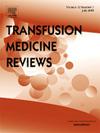Towards Safer Transfusion Therapies: The Role of Non-Inflammatory Fcy Receptor 1 Blockade
IF 2.5
2区 医学
Q2 HEMATOLOGY
引用次数: 0
Abstract
Introduction
The ongoing need to reduce reliance on intravenous immunoglobulin (IVIg) in treating autoimmune and inflammatory diseases calls for novel, targeted therapeutic strategies. Given the adverse events linked with Fcγ receptor (FcγR) III blockade, this study investigates the therapeutic potential of targeting FcγRI, demonstrated herein to be non-inflammatory, offering a more specific and safer alternative to the generalized action of IVIg.
Objective
This work aims to develop an in vivo anti-FcγRI therapy as a more focused and safer alternative to both IVIg therapy and FcγRIII blockade, with potential implications for improving patient outcomes and quality of life.
Design and Methods
From a phage display library, novel anti-human FcγRI antibodies were selected based on their high affinity and specificity for FcγRI. These antibodies were characterized for their ability to block Fc-FcγRI interactions using a human macrophage cell line and to prevent macrophage-mediated phagocytosis of sensitized red blood cells. The inflammatory nature of anti-FcγRI antibodies, compared to those engaging FcγRIII, was assessed through temperature changes and cytokine responses in FcγR-humanized mice, as well as in C57BL/6 and BALB/c mice, providing a comprehensive safety profile.
Results
We developed five novel anti-human FcγRI antibodies, each demonstrating a significant ability to inhibit FcγRI-mediated phagocytosis in vitro, without eliciting adverse inflammatory responses in vivo. Notably, anti-FcγRI administration did not result in the temperature changes or inflammatory responses observed with anti-FcγRIII, highlighting the non-inflammatory benefits of FcγRI targeting.
Conclusions
Our findings support the development of anti-FcγRI antibodies as a promising, non-inflammatory therapeutic approach for transfusion medicine. This strategy not only has the potential to reduce the dependency on IVIg but also offers a safer and more specific method for modulating the immune response in patients.
实现更安全的输血疗法:非炎症性 Fcy 受体 1 阻断剂的作用
导言:在治疗自身免疫性疾病和炎症性疾病时,需要减少对静脉注射免疫球蛋白(IVIg)的依赖,这就需要新颖的靶向治疗策略。鉴于 Fcγ 受体(FcγR)III 阻断剂的不良反应,本研究探讨了靶向 FcγRI 的治疗潜力。设计与方法从噬菌体展示文库中筛选出新型抗人FcγRI抗体,这些抗体对FcγRI具有高亲和力和特异性。利用人体巨噬细胞系鉴定了这些抗体阻断 Fc-FcγRI 相互作用的能力,以及阻止巨噬细胞介导的敏化红细胞吞噬作用的能力。结果我们开发了五种新型抗人 FcγRI 抗体,每种抗体都能在体外显著抑制 FcγRI 介导的吞噬作用,而不会在体内引起不良的炎症反应。值得注意的是,抗 FcγRI 给药不会导致抗 FcγRIII 观察到的体温变化或炎症反应,突出了 FcγRI 靶向的非炎症性优势。这一策略不仅有可能减少对 IVIg 的依赖,还能提供一种更安全、更特异的方法来调节患者的免疫反应。
本文章由计算机程序翻译,如有差异,请以英文原文为准。
求助全文
约1分钟内获得全文
求助全文
来源期刊

Transfusion Medicine Reviews
医学-血液学
CiteScore
11.60
自引率
0.00%
发文量
40
审稿时长
21 days
期刊介绍:
Transfusion Medicine Reviews provides an international forum in English for the publication of scholarly work devoted to the various sub-disciplines that comprise Transfusion Medicine including hemostasis and thrombosis and cellular therapies. The scope of the journal encompasses basic science, practical aspects, laboratory developments, clinical indications, and adverse effects.
 求助内容:
求助内容: 应助结果提醒方式:
应助结果提醒方式:


